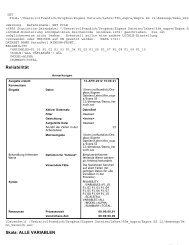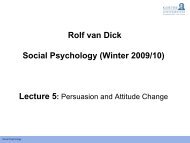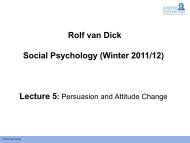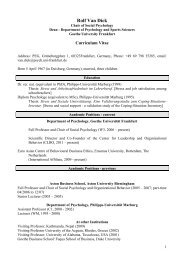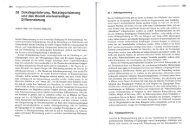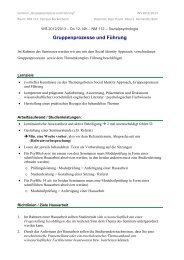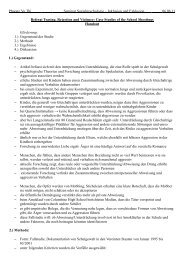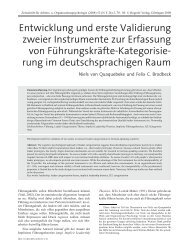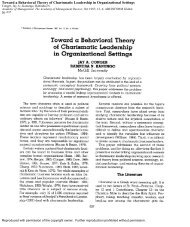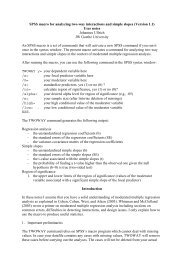Leadership-Interview-Transkript - Sozialpsychologie - Goethe ...
Leadership-Interview-Transkript - Sozialpsychologie - Goethe ...
Leadership-Interview-Transkript - Sozialpsychologie - Goethe ...
Erfolgreiche ePaper selbst erstellen
Machen Sie aus Ihren PDF Publikationen ein blätterbares Flipbook mit unserer einzigartigen Google optimierten e-Paper Software.
element of people oriented, enablement and empowerment, very self-motivated structures<br />
around that. So you can do both, and I think that is at the core of all the learning after Douglas<br />
McGregor. It is all about the combination of the one element with the other element. What<br />
makes military leaders – the good ones – so successful, is because they care so much about<br />
the people in their organization. They know: If we make mistakes as leaders, people will die.<br />
And in a military environment, it is not like in sports or in business, where you want to win<br />
21:20, and you still win, right. No, no, you want to win 21:0. No casualties on your side, you<br />
do not want to write letters home saying ‘your husband’ or ‘your wife’, ‘we lost them,<br />
because of mistakes we made in the field, in the organization, in the strategy, in the way we<br />
lead’, right. So I think, if we look at it more deeply, and I grew up in the military, there where<br />
you care the most, you will have the most of success. If you care and add the analytical and<br />
methodical strength to execute, you actually have the best of both worlds. And I think the<br />
future of great leadership is combining that in the best possible manner. And maybe an<br />
additional answer: That will be different, situation by situation by situation, yes. But it will<br />
have both.<br />
Rolf van Dick: What you are describing is also I think the modern, latest research on, say,<br />
transformational leadership. Leaders need to be able to both work with transactions, paying<br />
people or rewarding and punishing people for good or bad performance, and on top of that be<br />
considered, provide a vision, etc. Now, you can obviously also care for the wrong cause. So,<br />
which role do values play for deciding which is actually really good leadership or not? I<br />
mean, we see so many leaders of the banks at the moment, during the financial crisis, that<br />
have been good leaders because the banks have made large profit, but obviously whether they<br />
are really good leaders is at least a question…<br />
Patrick Cowden: A very relevant question. Especially the last three years, five years, maybe.<br />
You know, I call it the ‘phase of extreme capitalism’, we are gone very far on the capitalistic<br />
principles, of shareholder value, and doing anything it takes to maximize that principle. And I<br />
think it went the wrong way. I think most of the world would say it went the wrong way. But<br />
the question really gets back to the point of, you know, what is underlying all these systems,<br />
that really makes the difference. And I am with you – the method is on the one side, the<br />
process is on the one side, and then the emotional leadership on the other side, emotional<br />
intelligence. What everyone forgets is, what is underneath that. We do not talk about that so<br />
often. We talk about transformational energy, we talk about organizational energy. I was just<br />
in St. Gallen recently, with Heike Bruch, and talked a little bit about those pieces. I think what<br />
we forget is underneath that we talk values, underneath that we talk beliefs. And we neglect<br />
those two layers of organizational and transformational process. And because we neglect<br />
those layers, we get into problems a lot faster, because when you neglect something you do<br />
not talk about it, and when you do not talk about it, it is not a conscious element of your<br />
leadership structure, your leadership culture, and your leadership style. So what I believe is<br />
that the underlying element is what I call ‘belief’. It is believing in yourself as a leader,<br />
believing in your team, and believing in the purpose. If you do not believe in it, you may not<br />
know what it is. If you have got the wrong purpose, everything you do afterwards – it will be<br />
going the wrong path, right. So I think it is really important as a leader to get back to the<br />
basics of the fundamental beliefs that bind the organization together. It starts with yourself,<br />
extends to the team in the organization, and has a lot to do with the purpose. Only after that<br />
can you start talking about values. What are the values, that connect all the people in the<br />
organization together, that are bound to those beliefs. And those values, you know the words<br />
are integrity, and sincerity, and honesty, and openness, we say that a lot, but do we actually do<br />
it every day and in every interaction we have? So I think those two pieces, Rolf, you are very<br />
right, they are so fundamental, but they are so neglected in the discussions that we have and




